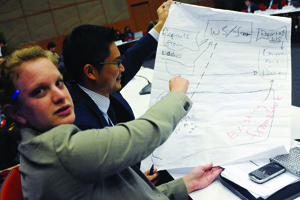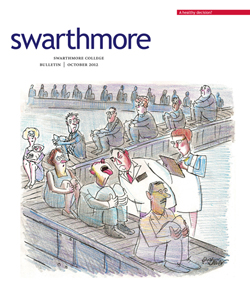A Passion for Politics
Anne Kolker ’08 takes on environmental issues on the global stage

At the Durban Climate Change Conference in December, Anne Kolker and a Japanese delegate use a flow chart as an aid in their discussion of how developing countries can make progress toward achieving their mission. Photo Leila Mead, courtesy of IISD/Earth Negotiations Bulletin
As the daughter of a U.S. diplomat, Anne Kolker ’08, an international climate change negotiator with the U.S. Department of State’s Office of Global Change, developed an early and lasting passion for politics and public service. When the time came, she sought a college where she believed she’d find herself among like-minded peers. She wasn’t disappointed.
“Arriving on campus in 2004, I found politics to be omnipresent,” she says. “In every class, whether intro to political science courses or astronomy, we always somehow ended up talking about political issues. I loved it and knew I wanted to be involved in some way. It was great to be around so many people who were as engaged as I was, always pushing you to take on a little more, to hone your vocabulary and your ideas. That was key in our being able to go out into the ‘real world’ already able to demonstrate a very high level of discourse.”
By fall 2006, Kolker says, she was working “a lot in campaign mode.” The peak of her work on electoral issues occurred during the 2008 presidential primary.
After graduating, Kolker was well prepared to step into a job at the Center for American Progress (CAP), a progressive think tank based in Washington, D.C., where she worked in the executive office of an organization with a pretty constant flow of Swarthmore alums—“not uncommon in D.C.,” she adds.
Kolker compares life in D.C. to life at a small liberal arts college: “Everyone knows each other; you see people at restaurants, happy hours, at the gym. All are really smart, engaged people, passionate about a lot of things. It’s definitely a place for high achievers. I chose Swarthmore for all of that, and I chose D.C. for the same reasons. I enjoy functioning in that kind of environment and community.”
Kolker also believes in the idea that you need to prove yourself before taking on major responsibilities. After two years with CAP, one of her former supervisors suggested she would be a good fit for the job she has now served in since 2010 and which has taken her on assignments to Europe, Asia, Central America, the Middle East, and Africa. At these meetings, she represents the U.S. government policies and views on a range of international climate change issues, mostly focused on helping developing countries strengthen their ability to take action on climate change.
A political science and theater major at Swarthmore, she says, “I had no environmental background, and I made it clear that I’d be walking into this blind in terms of general knowledge on that specific issue.
“Still, it was really exciting to come into a situation where you don’t know much, and there’s a lot to read and learn, and it’s really interesting,” she adds. “So you just put your nose to the grindstone and do it. I think that’s a feeling many Swatties can identify with. I love what I do, and I’ve now developed an expertise in those international environmental issues on which I work. It’s a field that I believe is important and will remain so.”
And through a serendipitous Swarthmore link, Kolker’s State Department job focuses on negotiations in the U.N. Framework Convention on Climate Change, whose executive secretary, Christiana Figueres ’79, spoke on campus last month.
 Email This Page
Email This Page